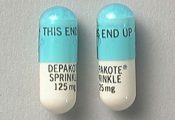By Michelle Welborn, PharmD
Medically Reviewed by Richard Johnson, Professor of Medicine
Last Update: August 13, 2024
Depakote (Divalproex Sodium) is a medication applied to epilepsy treatment, preventive measures of migraine and mental disorders treatment caused by manic-depressive disorder.
How to Buy Generic Depakote
This page is supplied with the most affordable offers of generic Depakote. This medication is acknowledged as one the most effective of epilepsy treatment. Put the button “Order Now” and arrange an order for this medication able to reduce the epileptic seizures.
Table of Contents
- Indications
- Dosage and Instruction for Use
- Overdose
- Contraindications
- Side Effects
- Drug Interactions
- Special Recommendations
- Storage
Product Info
Indications
Generic Depakote is used in the treatment of epilepsy and bipolar disorder. It can also be used effectively to stop migraine attacks.
The drug has an antiepileptic effect due to an increase in the level of GABA (gamma-aminobutyric acid) in the brain. This neurotransmitter affects the brain and nervous system, reducing the excitability of nerve endings, which prevents the occurrence of abnormal electrical impulses that cause seizures. GABA also has a stabilizing effect on the emotional state and is often used to arrest acute episodes of bipolar disorder (including manic and mixed forms).
Dosage and Instruction for Use
It is available in the form of delayed-release tablets at dosages of 125, 250 and 500 mg, as well as in sustained-release tablets at dosages of 250, 500, 750 and 1000 mg. In some cases, patients with manic syndrome due to bipolar disorder receive delayed-release tablets in a daily dosage of 250 mg. This dosage can be further adjusted and possibly reduced in order to detect a minimal maintenance dose providing a therapeutic effect.
Dosage for patients suffering from epilepsy depends on the type of seizures (complex partial, complex absences, and others). The dosage is selected individually together with the doctor.
Overdose
No data available.
Contraindications
You should not use Depakote if you are allergic to divalproex sodium, or if you have:
- liver disease;
- genitourinary dysfunctions;
- Genetic mitochondrial disorder, such as Alper’s disease, especially in a child younger than 2 years.
To make sure that this medicine is safe for you, tell your doctor if you have:
- liver problems caused by genetic mitochondrial disorder;
- a history of depression, mental disorders, or suicidal thoughts or actions;
- family history of a disorder of the urinary cycle or infant death with an unknown cause;
- HIV or CMV (cytomegalovirus).
Some young people have thoughts of suicide when taking Depakote for the first time. Your doctor will need to check your progress at regular visits while you are using this medication. Your family or other caregivers should also be aware of changes in your mood or symptoms.
Do not use Depakote to prevent migraine headaches if you are pregnant.
If you take this drug for seizures or manic episodes: this medication can harm an unborn baby or cause birth defects, can affect cognitive abilities later in a child’s life. However, the presence of seizures during pregnancy can harm the mother and the fetus. Do not start or do not take medicine during pregnancy without consulting your doctor.
Use effective birth control while using Depakote, and immediately tell your doctor if you become pregnant.
Tell your doctor if you start or stop using hormonal contraception containing estrogen (birth control pills, injections, implants, skin patches and vaginal rings). Estrogen can interact with divalproex sodium and make it less effective in preventing seizures.
Controlling the seizure is very important during pregnancy. The advantage of preventing seizures can outweigh any risks associated with Depakote. Follow your doctor’s instructions for taking this medicine while you are pregnant.
Side Effects
- nausea;
- vomiting;
- diarrhea;
- stomach pain;
- anorexia or increased appetite;
- ataxia;
- drowsiness;
- allergic skin reactions.
As a rule, these phenomena are temporary, can be weakened or eliminated by taking the drug during a meal, gradually increasing the doses.
With long-term use of acetiproles in large doses, reversible hair loss is possible.
Sometimes the drug causes the phenomena of general oppression and fatigue. This must be taken into account when assigning it to people performing intense physical and mental work.
Rare, but serious adverse reactions are:
- violations of the liver;
- pancreas;
- hemopoiesis (anemia, leukopenia, thrombocytopenia);
- a decrease in blood clotting.
Drug Interactions
If you take other drugs or supplements, concurrently with this drug, the effectiveness of Depakote may be changed. Tell your healthcare provider about all medications, vitamins and food supplements that you use. Your doctor will be able to make the correct plan for taking the drug, which will avoid negative interactions. Depakote can interact with the following drugs and products:
- Aripiprazole;
- Clonazepam;
- Duloxetine;
- Escitalopram;
- Lamotrigine;
- Lorazepam.
Special Recommendations
Do not use Depakote to prevent a migraine headache if you are pregnant.
If you are taking Depakote for seizures or manic episodes: do not start or stop taking the medication during pregnancy without consulting your doctor. It can harm an unborn baby, but seizures during pregnancy can harm both the mother and the fetus.
Epilepsy in Adults: A Guide for Health Professionals
You should not use Depakote if you have liver disease, urea cycle disorder, or a genetic disease, such as Alper’s disease or Alpera-Hattenocher’s syndrome (especially in a child younger than 2 years old).
It can cause liver failure, which can be fatal, especially in children under 2 years old and in people with liver problems caused by the genetic mitochondrial disorder.
Call your doctor right away if the person taking this medication has early symptoms of problems with the liver or pancreas such as:
- loss of appetite;
- abdominal pain;
- continuing nausea;
- vomiting;
- dark urine;
- swelling of the face;
- jaundice.
Storage
Store at room temperature 15-30 °C away from moisture and heat.
About the Author

Michelle Welborn, who holds a Doctor of Pharmacy degree from Campbell University, is the President of MWelborn Group, LLC, a consulting firm specializing in regulatory guidance for companies seeking FDA Orphan Designation and marketing approval. With 15 years of experience in pharmaceuticals, she has held key roles in Medical and Regulatory Affairs at Astra-Merck and Sanofi-Aventis, and served as a Clinical Pharmacy Manager for an HMO. Her deep understanding of childhood epilepsy, rare diseases, and drug development is driven by her daughter Lilly’s battle with Dravet syndrome. Michelle is a passionate advocate, representing children with rare diseases at international conferences and serving on advisory boards, including the Charlie Foundation and Lennox-Gastaut Syndrome Foundation.
Disclaimer: The information presented is for informational purposes only and should not be considered as medical advice. It is essential to consult a qualified healthcare provider before making any healthcare or medication decisions. This content is not a substitute for professional medical advice, diagnosis, or treatment.

